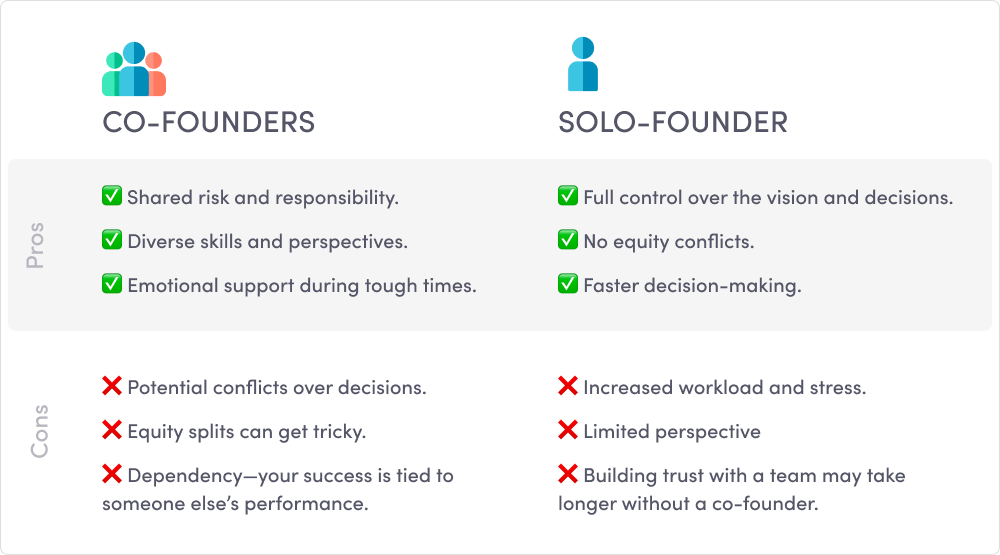Starting a business is like embarking on a rollercoaster ride – it’s exhilarating, challenging, and unpredictable. While some people prefer to tackle the adventure solo, others swear by the power of a partnership. This brings us to a question many aspiring entrepreneurs face: Do you need a co-founder for your startup?
In this blog, we’ll explore what a co-founder is, why choosing the right one is crucial, and the pros and cons of having or not having one. We’ll also provide tips on finding the perfect co-founder (if you decide you need one) and offer some final thoughts to help you make the best decision for your entrepreneurial journey.
So lets start with answering this question:
“What is a Co-Founder”?
Simply put, a co-founder is someone who partners with you to build and launch your startup. They are typically involved from the very beginning and share the responsibilities, risks, and rewards of building the business. Think of a co-founder as someone who believes in your vision as much as you do and is willing to get their hands dirty to make it a reality.
But here’s the thing: being a co-founder isn’t just about sharing work – it’s about sharing a journey. This leads us to the next big idea.
“A Co-Founder is Like a Business Spouse”
Imagine getting married but instead of wedding vows, you’re crafting a pitch deck. That’s what having a co-founder can feel like. The relationship is deep, and you’re tied together financially, emotionally, and strategically.
Like a marriage, your partnership will face highs and lows. You’ll celebrate wins, navigate conflicts, and make tough decisions together. If the chemistry isn’t right, the “divorce” can be messy and detrimental to the business. That’s why it’s critical to pick someone who complements you – not just in skills but also in values and work ethic.
Why Personal Qualities Matter
When choosing a co-founder, it’s tempting to focus solely on skills or experience. While those are important, personal qualities can make or break the partnership.
Here’s why:
Resilience: Startups are tough. You need someone who can weather storms with you.
Communication Skills: Miscommunication can lead to misunderstandings and conflicts.
Trustworthiness: This is someone you’ll share your financial and intellectual property with. Can you trust them?
Work Ethic: A great idea means nothing without execution.
Picking a co-founder is about finding someone who will stick with you through thick and thin – not just someone who looks good on paper.
Ok, but Why Do Startups Actually Need Co-Founders?
The truth is, nobody is great at everything. And building a startup is hard. It requires a wide range of skills, boundless energy, and unwavering resilience. For many entrepreneurs, the prospect of shouldering all that responsibility alone is daunting, if not outright impractical. This is where having a co-founder can make all the difference.
Let’s unpack why startups often thrive with co-founders:
Complementary skills: No one is great at everything. Some founders excel at coding but stumble when it comes to marketing. Others can sell ice to Eskimos but wouldn’t know where to start with product development. A co-founder can fill those gaps. For example, a technical co-founder can focus on building a robust product, while a non-technical co-founder can focus on building relationships, pitching to investors, and acquiring customers.
Broader Perspective: When you’re working on a startup, it’s easy to get tunnel vision. A co-founder brings a fresh perspective, which can lead to better decision-making. You’ll have someone to challenge your ideas, spot potential pitfalls, and offer alternative solutions.
Shared Workload: Starting a company involves wearing multiple hats – CEO, salesperson, accountant, marketer, and more. Even the most efficient solo founder will eventually hit a ceiling. With a co-founder, you can divide and conquer.
Increased Credibility: When pitching to investors, potential customers, or employees, having co-founders signals strength and stability. Investors often feel more confident funding a team rather than a solo founder because it shows that the workload is shared and the business is less reliant on one individual.
Faster Problem-Solving: Two heads are often better than one when it comes to tackling complex problems. With a co-founder, you can brainstorm together, draw on each other’s expertise, and arrive at solutions faster than you would alone.
Startups thrive on collaboration, innovation, and resilience – all of which are easier to achieve with a co-founder. And while co-founders are beneficial at any stage, their value is especially evident during:
Early Development: Combining skills to turn an idea into a viable product.
Fundraising: Presenting a united, diverse team to potential investors.
Scaling: Dividing leadership responsibilities to manage rapid growth.
Technical vs. Non-Technical Co-Founders
When discussing co-founders, you’ll often hear about “technical” and “non-technical” founders. Here’s the difference:
Technical Co-Founder: Someone with expertise in building the product (e.g., software developer, engineer).
Non-Technical Co-Founder: Someone with skills in areas like sales, marketing, or business strategy.
Both are crucial, but their roles vary. For example, Bill Gates (technical) and Paul Allen (non-technical) co-founded Microsoft, combining their strengths to create a tech empire.
The co-founder model has birthed some of the most successful companies in the world:
- Apple: Steve Jobs (visionary) and Steve Wozniak (technical genius).
- Google: Larry Page and Sergey Brin, who brought their technical expertise together to revolutionize search.
- Airbnb: Brian Chesky, Nathan Blecharczyk, and Joe Gebbia, who combined their creative and technical skills.
These examples show how co-founders can create magic when their skills and personalities align.
What About Solo Founders?
While co-founders are the norm in the startup world, being a solo founder is absolutely an option. I’ll just mention Jeff Bezos (Amazon) and Sara Blakely (Spanx) as examples. Their success stories prove that with the right vision, skills, and determination, it’s possible to build a thriving company on your own.
Solo founders often have a clear vision and the freedom to make decisions without having to align with a partner. They don’t have to compromise or align with a partner’s ideas, making decision-making faster and more straightforward. Plus, they retain 100% of the equity, which can be a significant financial advantage.
However, going solo also comes with notable challenges. Solo-founders need to wear multiple hats – handling everything from product development to marketing, sales, fundraising, and hiring. The workload can quickly become overwhelming, and the lack of a co-founder to share the burden means they need a robust support system, such as mentors, advisors, or a strong team.
Solo founders must be exceptionally resourceful and self-motivated. Surrounding themselves with a talented team and seeking external support early on can help overcome the unique challenges of solo entrepreneurship.
Co-Founders vs. Solo Founders: How to Choose?
With all said, lets break it down to a simple list of pros and cons, which will help you determine how you’d like to approach this question:

Tips for Finding the Right Co-Founder
If you decide that having a co-founder is the way to go, here are some tips:
Avoid Equal Shares, But Be Fair
Splitting equity 50/50 might sound logical, but it can lead to problems down the line. Instead, decide equity based on contributions, skills, and long-term commitment.Set Role Expectations Early
Define who does what. Ambiguity leads to misunderstandings. If one person handles tech while the other focuses on business, make it clear from the start.Have the Hard Talks Early
Discuss potential conflicts, exit strategies, and what happens if one co-founder underperforms. It’s better to address these issues upfront than during a crisis.Vest Founders’ Stocks
To protect the company, implement a vesting schedule for equity. This ensures that a co-founder earns their share over time, preventing situations where someone leaves early but still owns a big chunk of the business.Pick Someone Who Knows the Industry
If you’re building legal software, a co-founder with a legal background could be invaluable. Domain expertise can accelerate your growth.
Whether you’re flying solo or teaming up with co-founders, one thing remains critical: having a stellar team to bring your vision to life. That’s where Wecraft Media comes in. With over 12 years of experience building SaaS products and empowering startups to reach their full potential, we’re here to help you turn your big idea into reality.
Ready to get started? Drop us a line or schedule a call at a time that works best for you – we’d love to chat about how we can support your journey!
Final Thoughts
The decision to bring on a co-founder – or go it alone – is deeply personal and depends on your vision, skills, and goals. Co-founders can bring diverse skills and shared responsibilities, but they also introduce complexities. Solo founders enjoy full control but face a heavier workload.
If you do decide to find a co-founder, choose wisely. Treat the process like hiring for a dream job—it’s worth taking your time to get it right. At the end of the day, whether you’re flying solo or teaming up, what matters most is your commitment to the journey.
And remember: the only wrong decision is not starting at all! 🚀





